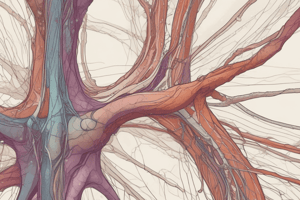Podcast
Questions and Answers
What are the two primary divisions of the nervous system?
What are the two primary divisions of the nervous system?
- Central and peripheral systems (correct)
- Somatic and autonomic systems
- Sympathetic and parasympathetic systems
- Sensory and motor systems
Which type of nerve is responsible for transmitting impulses from the periphery to the central nervous system?
Which type of nerve is responsible for transmitting impulses from the periphery to the central nervous system?
- Mixed nerve
- Sensory nerve (correct)
- Motor nerve
- Autonomic nerve
What is the role of neurotransmitters in the nervous system?
What is the role of neurotransmitters in the nervous system?
- To inhibit nerve impulses in the central nervous system
- To provide structural support to neurons
- To transfer the depolarizing electrical impulse between neurons (correct)
- To generate electrical impulses in muscle cells
Which receptors are utilized by both the sympathetic and parasympathetic nervous systems?
Which receptors are utilized by both the sympathetic and parasympathetic nervous systems?
What distinguishes a mixed nerve from other types of nerves?
What distinguishes a mixed nerve from other types of nerves?
Which classification system categorizes the nervous system based on cellular receptors?
Which classification system categorizes the nervous system based on cellular receptors?
Which type of sensation is a sensory nerve not specialized to detect?
Which type of sensation is a sensory nerve not specialized to detect?
What type of neurotransmitter is primarily involved in the sympathetic nervous system?
What type of neurotransmitter is primarily involved in the sympathetic nervous system?
What is the main role of catecholamines in the nervous system?
What is the main role of catecholamines in the nervous system?
Which of the following types of drugs are classified as parasympathomimetics?
Which of the following types of drugs are classified as parasympathomimetics?
Which statement correctly describes the effects of sympathomimetic drugs?
Which statement correctly describes the effects of sympathomimetic drugs?
What is a characteristic of neuromuscular blocking agents?
What is a characteristic of neuromuscular blocking agents?
What type of medications fall under behavioral medications?
What type of medications fall under behavioral medications?
Flashcards are hidden until you start studying
Study Notes
Nervous System Overview
- The nervous system is categorized based on various classification systems which aid in understanding its components and functions.
- Divisions of the nervous system include:
- Central Nervous System (CNS): Comprises the brain and spinal cord.
- Peripheral Nervous System (PNS): Encompasses all nerves outside the CNS.
Functional Divisions
- The nervous system is also split into:
- Somatic Nervous System: Controls voluntary movements.
- Autonomic Nervous System: Regulates involuntary processes and has two branches:
- Sympathetic Nervous System: Activates response during stress (fight or flight).
- Further divided into cholinergic and adrenergic systems based on receptor types.
- Parasympathetic Nervous System: Restores calm and regulates bodily functions during rest (rest and digest).
- Sympathetic Nervous System: Activates response during stress (fight or flight).
Neuroceptors and Neurotransmitters
- Various types of neuroceptors exist:
- Adrenergic, muscarinic cholinergic, nicotinic cholinergic, dopaminergic, GABAergic, glycinergic, histaminergic, opioidergic, and serotonergic.
- Neurotransmitters facilitate communication between neurons by transferring electrical impulses.
Types of Nerves
- Sensory Nerves: Carry impulses from the periphery to the CNS; specialized for sensations like temperature, pressure, and pain (nociception).
- Motor Nerves: Transmit impulses from the CNS to muscles, triggering contractions.
- Mixed Nerves: Perform both sensory and motor functions.
Sympathetic and Parasympathetic Systems
- Both systems feature cholinergic receptors.
- Sympathetic system employs catecholamines, which act on adrenoceptors, to regulate body functions after activation by acetylcholine.
Nervous System Drugs
- Cholinergic Drugs: Include agonists (parasympathomimetic) that enhance acetylcholine activity and antagonists (parasympatholytic) that inhibit it.
Adrenergic Drugs
- Sympathomimetics: Agonists that mimic sympathetic nervous responses.
- Antagonists: Block sympathetic nervous responses.
CNS Drug Categories
- Tranquilizers (Neuroleptics): Manage anxiety and psychotic disorders.
- Dissociative Agents: Induce a trance-like state.
- Opioids: Pain relief medications.
- Neuroleptanalgesics: Combine analgesics and sedatives.
- Seizure Control Medications: Treat epilepsy and seizure disorders.
- Behavioral Medications: Include various types:
- Antianxiety, antidepressants, cognitive enhancers, and synthetic progestins.
Special Considerations
- Euthanasia Drugs: Used in humane animal euthanasia.
Visual Aids
- Diagrams illustrating the structure and function of the nervous system (edges, nerve cells, and receptor types) are valuable for visual learners.
Studying That Suits You
Use AI to generate personalized quizzes and flashcards to suit your learning preferences.





